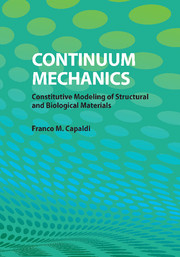7 - Elastic Material Models
Published online by Cambridge University Press: 05 August 2012
Summary
In this chapter, we discuss constitutive model development for elastic materials. A material is considered purely elastic if it lacks the means to internally dissipate energy during deformation. Thus, a purely elastic material will not exhibit hysteresis or rate dependence. In addition, the deformation of an elastic material is reversible. Removal of load will allow the material to regain its original shape. A thermoelastic material model was used to introduce the concepts of constitutive modeling in Chapter 4. While many of the results from the analysis in Chapter 4 will be restated here, the reader may refer back to Chapter 4 for the detailed derivations.
While first developing the general framework for finite thermoelasticity, we will also discuss specialization of the model for isothermal finite elasticity, which assumes constant uniform temperature fields, hyperelastic materials for which there exists a strain energy function, and linear thermoelastic materials for which stress and strain are proportional. While the linear dependence between stress and strain works well for some materials, many engineering materials such as natural and synthetic polymers exhibit strong nonlinearity of the stress-strain curve even before yielding. This leads to a material nonlinearity in the constitutive response functions. In addition, subjecting any material model to large strains leads to a geometric nonlinearity. Large strain deformation is referred to as finite deformation. Interestingly, some of these polymers may be deformed to very large strains and recover their original shape when released.
Information
- Type
- Chapter
- Information
- Continuum MechanicsConstitutive Modeling of Structural and Biological Materials, pp. 183 - 213Publisher: Cambridge University PressPrint publication year: 2012
